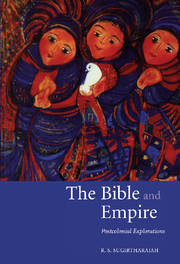Book contents
- Frontmatter
- Contents
- Acknowledgements
- Introduction
- 1 Textually conjoined twins: Rammohun Roy and Thomas Jefferson and their Bibles
- 2 Salvos from the Victorian pulpit: conscription of texts by Victorian preachers during the Indian rebellion of 1857
- 3 Thorns in the crown: the subversive and complicit hermeneutics of John Colenso of Natal and James Long of Bengal
- 4 Texts and Testament: the Hebrew scriptures in colonial context
- 5 Imperial fictions and biblical narratives: entertainment and exegesis in colonial novels
- Afterword
- Select bibliography
- Index of biblical references
- Index of names and subjects
2 - Salvos from the Victorian pulpit: conscription of texts by Victorian preachers during the Indian rebellion of 1857
Published online by Cambridge University Press: 02 December 2009
- Frontmatter
- Contents
- Acknowledgements
- Introduction
- 1 Textually conjoined twins: Rammohun Roy and Thomas Jefferson and their Bibles
- 2 Salvos from the Victorian pulpit: conscription of texts by Victorian preachers during the Indian rebellion of 1857
- 3 Thorns in the crown: the subversive and complicit hermeneutics of John Colenso of Natal and James Long of Bengal
- 4 Texts and Testament: the Hebrew scriptures in colonial context
- 5 Imperial fictions and biblical narratives: entertainment and exegesis in colonial novels
- Afterword
- Select bibliography
- Index of biblical references
- Index of names and subjects
Summary
We fight for independence. In the words of Lord Krishna, we will, if we are victorious, enjoy the fruit of victory, if defeated and killed on the field of battle, we shall surely earn eternal glory and salvation.
Rani Lakshmi BaiThe Englishman never goes to a place without a Bible. It precedes, or closely follows, his sword.
A. Madhaviah‘Bring me a sword.’
1 Kings 3.24If the first casualty of war, as the cliché goes, is truth, the second casualty to sustain heavy collateral damage is text. In war, along with truth, texts of various kinds, ranging from reports of the battle to religious texts that justify it, also fall victim to the hands of both proponents and opponents. This chapter is about the misuse of biblical texts when they were conscripted by Victorian preachers and employed as potent textual weapons during the Indian insurrection of 1857.
In the middle of the nineteenth century there was a passionately fierce and violent reaction against the penetration, presence and powerful influence of the British in India. Hindus and Muslims fought side by side, their collective outrage directed at their common enemy, the British – in the form of the East India Company – who were blamed for disrupting both the religious and the political traditions of the country and intensifying the suffering of the people. This rebellion, or mutiny, was an affair mainly restricted to the northern states of India.
- Type
- Chapter
- Information
- The Bible and EmpirePostcolonial Explorations, pp. 60 - 97Publisher: Cambridge University PressPrint publication year: 2005

